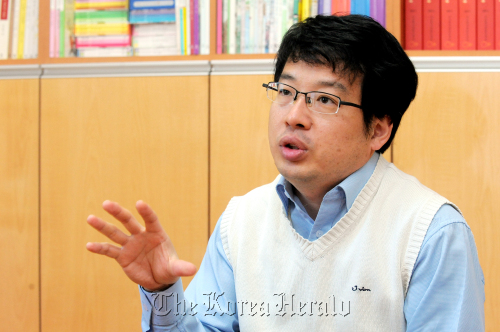Civic group against private education criticizes early foreign language learning
Early English education does not always guarantee proficiency in the language or a good school record. In fact, some believe it could disrupt a child’s balanced development.
Their assertion runs counter to a widespread belief among Koreans that starting education early is necessary to give children a head start when it comes to language acquisition.
Starting English education at the right time rather than early is important, so the beginning of English education after a child develops cognitive ability is not late at all, they say.
“Generally, early English education is costly, yet its effect falls far short of expectations. Still, parents ill-informed of early English education tend to stress young children out by forcing them to study excessively,” Kim Seung-hyun, policy director and vice president of World Without Worries about Private Education, recently told The Korea Herald.
 |
Kim Seung-hyun, policy director and vice president of World Without Worries about Private Education, talks about early English education and its effect on children. (Ahn Hoon/The Korea Herald) |
WWWPE is a civic group which campaigns against overheated private education in Korea. It recently released a booklet entitled “Wasted Time Learning English.”
The brochure lists 12 myths about early English education in the country. For example, they say that if you believe that English immersion education at the kindergarten-level or children’s summer vacation camps must help in the acquisition of English proficiency, you are wrong. Or, if you think that a high score in English proficiency tests such as TOEIC and TOEFL at an early age will lead to an easy admission into elite high schools, they say you are misguided.
The booklet says that parents will have more to lose if they send children to kindergartens that offer English immersion programs. Kindergartners have not acquired the mother tongue yet, so intensive English education may hurt speech ability in both native and foreign languages. English summer camps with intensive courses will likely reduce children’s interest in English, rather than stoking it.
Also, they say high scores in TOEFL, TOIEC and the like never guarantee admission into prominent high schools, but merely stress children out.
In Korea, English is not just a foreign language; it is crucial to going on to university or landing a job as the major subject of college or company entrance tests.
These are among the reasons why spending on private English education amounted to nearly half of 20.9 trillion won ($18.6 billion) in private education expenditures in 2009.
“Children who receive early English education may outperform their peers who don’t, but their school performance won’t last long. As they grow up, those with good study habits will lead,” Kim said.
“I hope the book will reduce parents’ anxiety about early English education. I would like to see them stop forcing their children to learn the foreign language at a young age, and instead send them to common kindergartens for balanced development.”
Saying that one should direct their own study, not follow instructions by parents or private tutors, Kim stressed that communication skills and logical thought are more important than fluent speech.
Turning to public education, he said that its role should be focused on extracurricular English activities, away from formal teaching as a curriculum.
He cited successful English education in northern European countries such as Finland, Sweden and Denmark. Public education there plays the role of facilitator between curricular and extracurricular English education, he said.
Children in northern Europe have more opportunities than those in Korea to be exposed to English both on and off campus. Libraries have lots of English books, and television networks air English television shows and movies.
Thanks to easy accessibility to English language content, they seem to have a better command of English than Koreans despite a shorter education, he said. A total of 480 hours is required in Sweden for mandatory English classes over six years while 731 hours are required in Korea over eight years.
“Achieving a good command of English only through school classes is hard. But public education in conjunction with extracurricular programs will help students upgrade their level of English. One way to do so is giving assignments of reading English books at home,” Kim said. “Old-fashioned English education methods (for adults) failed not in terms of their inability to utter a single sentence when addressed by foreigners, but in a sense that they lost motivation to read English books for themselves,” said Kim.
He stressed the need to set English education strategies tailored to the Korean society, questioning the effects of simply increasing English class hours or recruiting more foreign teachers.
“We have to accept the reality that English is a foreign language in Korea, and create an environment that can expose people to English in their daily lives. We need to expand infrastructure for English education, such as building English libraries,” Kim said.
By Lee Woo-young (
wylee@heraldcorp.com)








